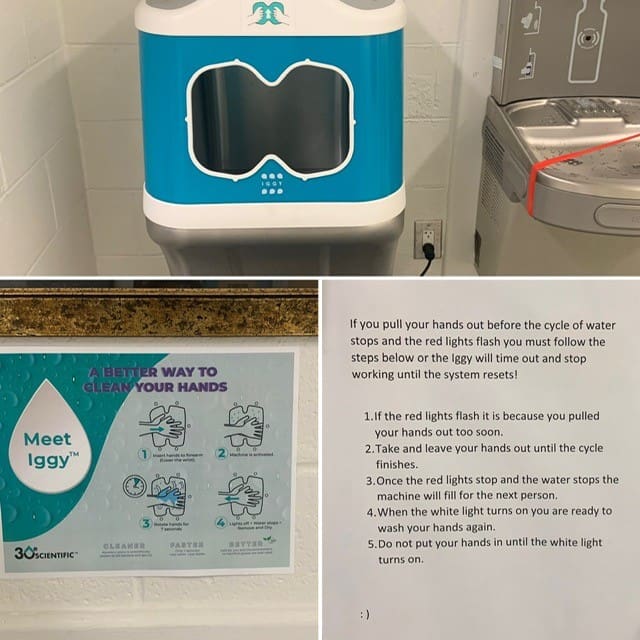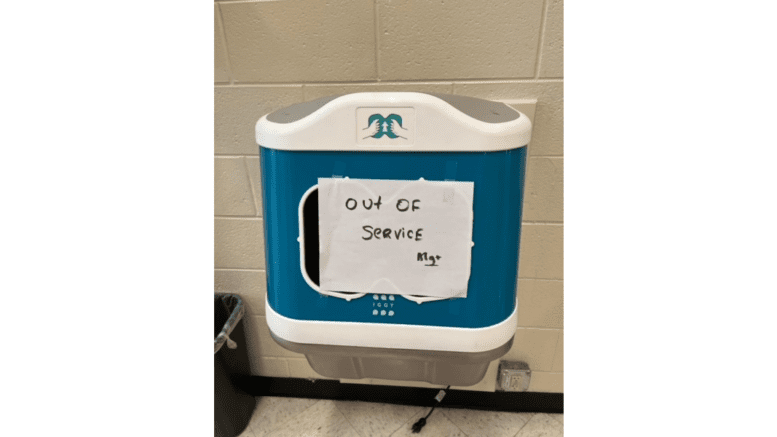Photo provided by Watching the Funds
by Rebecca Gaunt
The company that provided the much derided Iggy hand rinsing stations filed for bankruptcy Monday, which has once again drawn scrutiny to the original procurement process by Cobb County School District, especially since the award letter to 3Oe Scientific was dated two days before the board voted to approve it.
Carmel, Indiana-based 3Oe Scientific filed for Chapter 11 bankruptcy in Indianapolis. The five-year-old company claimed debts of $8.1 million and assets of $188,814.
The hand rinsing stations, which cost about $14,000 a piece, according to open records obtained by Watching the Funds – Cobb, have not only been decried as impractical in a school setting since their installment, but seem to malfunction with great frequency.
In October 2022, the Atlanta Journal-Constitution used open records to publish an article showing that the machines had malfunctioned more than 100 times. More than half of the district’s elementary and middle schools had submitted at least one maintenance request.
Read the article here: Cobb schools’ hand-rinsing stations malfunctioned more than 100 times (ajc.com)
Watching the Funds regularly posts photos of broken machines sent in by the community.
New machines have been installed as recently as October at the just-opened new East Valley Elementary School, despite the ongoing issues.
According to open records requests, the district has spent about $10 million.
From Carmel to Cobb

In October 2020, Cobb County School District held a press conference to show off the Iggy hand rinsing devices and ultraviolet lights for cleaning classroom surfaces from a different company called Protek. The new technology was installed for proof of concept testing at Bryant Elementary School in Mableton and Argyle and Belmont Hills Elementary Schools in Smyrna.
The intent was to illustrate that schools were safer to return to in-person learning during the pandemic.
On Dec. 17, 2020, Superintendent Chris Ragsdale requested the board approve $12 million to install both products districtwide. The board approved it 4-2 with Democratic board members Charisse Davis and Jaha Howard opposed.
The district sent a contract award letter to Dr. Thomas Foust, CEO and founder of 3Oe dated Dec. 15, 2020, two days prior to the vote.
“There’s no empirical data to say we decreased by x percent or we increased by x percent. It’s anecdotal,” Ragsdale said in response to a question from Wheeler about effectiveness at the December meeting.
Ragsdale went on to say that all the Bryant COVID cases came from outside the school, according to contact tracing.
“The data shows, if you will, that Bryant Elementary School has been positively impacted by both of these products being on site,” he said.
Howard asked for more time to obtain data on the products’ use in a school environment, particularly in light of both products being new.
“It may be a proven product over time, but what I’m suggesting is that these companies are new,” Howard said. “We don’t have scientific data. There’s nothing for parents to go research.”
Ragsdale argued that while the product was new, use of aqueous ozone was not.
Tension rose throughout the meeting as board member Randy Scamihorn repeatedly cut in and Howard reminded him that he was not the parliamentarian (Brad Wheeler was serving as chairman at the time).
In February 2021, the UV lights malfunctioned and activated while students were present. The district requested removal and a refund. It has never confirmed receiving that refund.
At the March 2021 board meeting, Dr. Robert Lubitz did a presentation on the Iggy hand rinsing stations at the superintendent’s request.
He described the product as maximizing frictional force with aqueous ozone and providing unique healing properties
“This technology is different than anything that’s currently available in the U.S,” he said.
Additionally, the price tag included three years of maintenance and warranty support.
Prior to Cobb County it had never been used in a school setting, or in a situation with hundreds of kids in one cafeteria, Howard pointed out.
“I’m thinking about seven seconds per child, when you do the math, that leads to a–we have one or two Iggys– that leads to a really long line, so I’m trying to think practically, what does that look like?” Howard asked.
Much like the December meeting, Howard and Scamihorn (now the chairman) were at odds.
“We’ve been asking these questions since October and I was just hoping–I’ve been waiting a long time to have this very conversation. This is just a back up from emails, phone conversations and personal conversations, and we’re finally able to talk about it,” Howard said. “I just assumed that y’all didn’t have any questions because we didn’t have questions for several months.”
Scamihorn responded that Howard’s narrative was “out of order.”
Howard also questioned why money was allocated and installation started months before the presentation. He asked Lubitz if he had been able to do his presentation for anyone prior to the March meeting, which drew Scamihorn’s ire.
Ragsdale explained that the company was chosen after a request for proposals (RFP) went out from the district.
At Howard’s prodding, Lubitz acknowledged that he met with Ragsdale and former Republican state representative Bert Reeves to discuss the technology prior to the RFP, but did not disclose the date that occurred.
Ragsdale said the presentation for the board was unusual and unnecessary, given that the district used the RFP process, “But as far as presenting to the board, the reason I asked Mr. Smith to contact 3Oe is because, quite honestly, misinformation was being put out about the science actually working on COVID-19.”

Ragsdale also said COVID-19 would eventually be “in the rearview mirror” and this would still be a relevant product.
Diarrheal illness was much more a focus of the presentation than the combatting of COVID-19.
The superintendent advised that the appropriate avenue for Howard to ask questions was to direct them directly to him or the executive cabinet. Howard said he had tried to do so unsuccessfully.
In response to a question from Scamihorn, Lubitz explained that the Iggys were not a substitute for traditional handwashing in the case of kids coming in from a playground with dirt on their hands. He advised use of both methods in such a case.
Board member Charisse Davis drew attention to the fact that the RFP was for hand sanitizing devices, but the Iggys are marketed as hand rinsing devices due to FDA requirements.
No actual data from the test schools was presented, which led to another tense exchange between Howard and Scamihorn.
Howard pushed aggressively for the data to justify the $12 million expenditure. Scamihorn banged his gavel, declared him out of order, and called for a five-minute recess.
When the board returned, Scamihorn moved to the next item on the agenda.
Watching the Funds – Cobb
“Once again, we funded research and development, much like AlertPoint and the UV lights,” Heather Tolley-Bauer, co-founder of Watching the Funds, told the Courier.
The period for the RFP was so brief that Tolley-Bauer questioned how much due diligence was done.
“In lieu of transparency we work really hard to connect the dots,” she said.
The district did not respond to questions from the Courier about how the bankruptcy could affect the warranties and maintenance.
In his presentation, Lubitz asked how many plastic hand sanitizer bottles end up in landfills.
Of the Iggys, he said, “There’s no landfill here.”
Only time will tell.
